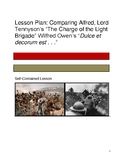Wilfred owen purpose in dulce et decorum est pdf
Wilfred Owen establishes a sense of conflict in his poetry, this is depicted in “Anthem for Doomed Youth” and in “Dulce et Decorum est”. There are a number of themes in Owen…
Analysis Of Wilfred Owen ‘s Poem ‘ Dulce Est Decorum Est 1229 Words 5 Pages Wilfred Owen ‘s work has a recognisable purpose of portraying the destructive capacity of war, and its ultimate futility.
6/06/2014 · DULCE ET DECORUM EST. One hundred years old and still the most effective anti-war poem ever written, “Dulce Et Decorum Est” was composed near the end of the First World War by Wilfred Owen, a poet
Question and answer worksheets based on Wilfred Owen info sheet, Dulce Et Decorum Est and The Last Laugh analysis.
Dulce Et Decorum Est In the two poems “Dulce et Decorum Est,” by Wilfred Owen and “The Death of the Ball Turret Gunner,” by Randall Jarrell, a common theme is expressed among the two. The expendability of life in warfare is that theme.
Reading “Dulce et Decorum Est” may not be a walk in the park. But Owen’s struggling with a difficult issue: he’s trying to get a country to pay attention to the fact that people are dying. Whether or not you support of a particular war (or even war in general), it might be a …
Wilfred Owen uses many techniques in his poem Dulce et Decorum est to convey the horror and conditions The poem “Dulce et Decorum est” is about the horrible things the soldiers had to see and the awful conditions that the soldiers had to fight through.
Dulce et Decorum Est Wilfred Owen , 1893 – 1918 Bent double, like old beggars under sacks, Knock-kneed, coughing like hags, we cursed through sludge, Till on the haunting flares we turned our backs And towards our distant rest began to trudge.
Owen’s most famous poem ‘Dulce Et Decorum Est’ paints a stomach-churning image of a victim of a gas attack, describing his ‘white eyes writhing in his face, his hanging face, like a devil’s sick of sin’. In poems such as ‘Mental Cases’, Owen shows the profound mental effect of the war on a great deal of soldiers, grotesquely describing their faces as ‘wearing this hilarious
Owen wrote Dulce et Decorum Est in October 1917, by which time phosgene (and the similar chemical diphosgene) had long replaced chlorine as the main chemical weapon. If he were describing a real situation from his own experience — his active service on the front lines was 1916-18, not 1915 — then the dying soldier would almost certainly have been poisoned by phosgene.
dulce et decorum est- wilfred owen Dulce Et Decorum was a poem written by Wilfred Owen when he was in hospital. It is a poem that is most commonly known because of the bitter truth that Owen …
“Dulce et Decorum est” is a war poem written by Wilfred Owen, one of the most significant war poets, during World War I. He was born in 1893 in Shropshire and he was educated in Liverpool.
DULCE ET DECORUM EST – the first words of a Latin saying (taken from an ode by Horace). The words were widely understood and often quoted at the start of the First World War. They mean “It is sweet and right.” The full saying ends the poem: Dulce et decorum est pro patria mori – it is sweet and right to die for your country. In other words, it is a wonderful and great honour to fight and die
‘Disabled’ and ‘Dulce et Decorum Est’ are war poems by the poet Wilfred Owen. Imagery and vocabulary in both of these poems are significant in representing mood, atmosphere and purpose.
Dulce et Decorum Est Imagery symbolism and themes

DULCE ET DECORUM EST- WILFRED OWEN
The poem’s author is Wilfred Owen and the poem is titled ‘Dulce et “Dulce et Decorum est” – Essay A poem ‘Dulce et Decorum est’ by Wilfred Owen conveys the horrors of war and uncovers the hidden truths of t…..Read the essay free on Booksie.
‘Dulce et Decorum Est’ is a poem by the British poet Wilfred Owen, drafted at Craiglockhart War Hospital near Edinburgh in 1917. Owen had been admitted to the hospital after suffering from shell shock after a period of fighting in the Battle of the Somme.
‘Dulce et Decorum Est’ or, to give the phrase in full: Dulce et decorum est pro patria mori, Latin for ‘it is sweet and fitting to die for one’s country’ (patria is where we get our word ‘patriotic’ from). The phrase originated in the Roman poet Horace, but in ‘Dulce et Decorum Est’, Wilfred Owen (1893-1918) famously rejects this idea. For Owen, who had experienced the
Dulce et Decorum Est – Imagery, symbolism and themes Imagery in Dulce et Decorum Est Simile. Dulce et Decorum Est is rich in similes whose function is to illustrate as graphically as possible the gory details of the war and in particular a gas attack.
Wilfred Owen. Dulce Et Decorum Est. Bent double, like old beggars under sacks, Knock-kneed, coughing like hags, we cursed through sludge, Till on the haunting flares we turned our backs
Brutality of war including wilfreds two poems “Dulce et Decorum Est” and “Anthem for Doomed Youth”. 3 Exchange Credits. Add to Cart. Proceed to Cart. This is an Essay / Project Essays / Projects are typically greater than 5 pages in length and are assessments that have been previously submitted by a student for academic grading. What are Exchange Credits? Exchange Credits represent the
‘Dulce et Decorum Est’ by Wilfred Owen and ‘The Soldier’ by Rupert Brooke are poems about war which treat their subjects differently. Both poems are examples of the authors’ perceptions of war; Owen’s being about its bitter reality and Brooke’s about the glory of dying for one’s country.

“Dulce et decorum est” In this poem the poet describes his own experience of the horrors of the war in trenches. Furthermore, this poem is an attempt to communicate the “pity” of the war to
“Dulce et Decorum” est is a poem about war written by Wilfred Owen during World War 1 in 1917-1918. He was a soldier who experienced war first hand and wrote his poem with primary information. “The Charge of The Light Brigade” is also a poem about war that was written by Alfred Lord Tennyson, a poet Laureate during the 19th Century. Tennyson uses secondary information to write his poem
Wilfred Owen, like so many other people, was deeply affected by the experience of World War I. In previous wars, the armies would line up and charge one another. In WWI, however, chaos and
28/02/2014 · An animated adaption of Wilfred Owen’s harrowing poem ‘Dulce Et Decorum Est’, to mark the 100th year anniversary of the First World War. …
‘Dulce et Decorum Est’. As an early twentieth century poet, Owen is As an early twentieth century poet, Owen is careful in his attention to structure, rhyme and meter to convey meaning,
As seen in both poems, ‘Dulce et Decorum est Pro Patria Mori’ and ‘Anthem for Doomed Youth’ Owen brings the audience into the his world, making them feel and think like him, knowing what he has experienced and what he dreads, and therefore successfully involves the reader into the world of poetry.
Wilfred Owen, War Poems and Others Wilfred Owen’s poetry is shaped by an intense focus on extraordinary human experiences. Select TWO poems set for study and explore Owen’s portrayal of suffering and pity. The prescribed poems are: – Wilfred Owen, War Poems and Others The Parable of the Old Man and the Young Anthem for Doomed Youth Dulce Et Decorum Est Pro Patria Mori …
Wilfred Owen uses many techniques in his poem “Dulce et Decorum est” to convey the horror and conditions of the war. These techniques will be explained and the purpose of each section will be will also be described. In the first section…

In this poem, by Wilfred Owen ‘Dulce et decorum est’ Owen was attempting to across the full horror of the First World War. In great detail get he describes a soldier suffering and dying in a gas attack.
Wilfred Owen ’s poems s uch as Disabled, Spring Offensive, Dulce et Decorum EST and Exposure show the direction in which he n arrates the pity o f soldiers. It exposes the undignified,
Thus, THE SENTRY takes its place alongside, for example, DULCE ET DECORUM EST, THE SHOW, MENTAL CASES, and relentlessly unveils the full scale of war’s horrors. One of his techniques is to make use of onomatopoeia (words echoing the sound of what he is describing).
The poem ‘Dulce et decorum est’ by Wilfred Owen deals with both loss and deep sadness. Immediately in the poem there are very strong images being used throughout the poem and this shows the sadness from the very start. Figures of speech are …
6/10/2012 · Part 1 of the line by line analysis of Wilfred Owen’s ‘Dulce Et Decorum Est’. Created by P. Dunning.
Study Questions for Wilfred Owen’s “Dulce et Decorum Est” Vocabulary: allusion, imagery, modernism, trench poets, verbal irony
Wikisource has the original text of “Dulce et Decorum est” Poems was a quarto volume of poetry by Wilfred Owen published posthumously by Chatto and Windus in 1920. Owen had been killed on 4 …
Dulce et Decorum est Wikipedia
Activity 2: Wilfred Owen – Dulce et Decorum Est Wilfred Owen enlisted in the army in 1915. In November 1918, he was killed while attempting to lead his men across the Sambre canal at Ors. Pay attention to the different levels of language in this poem. We use different levels of language every day. For example, formal language when writing essays or reports, and informal language when writing
8/11/2018 · Poems by Wilfred Owen/Dulce et Decorum est. From Wikisource < Poems by Wilfred Owen. Jump to navigation Jump to search. For other versions of this work, see Dulce et Decorum est. ←Insensibility. Poems by Wilfred Owen by Wilfred Owen Dulce et Decorum est. The Sentry→ sister projects: Wikipedia article. — DULCE ET DECORUM EST Bent double, like old beggars under …
Published: Thu, 29 Jun 2017. Dulce et decorum est is a famous anti-war poet written by Wilfred Owen in 1917, during the WWI. It portrays war as a brutal and dehumanizing experience by utilizing a number of horrific, gruesome imageries effectively. – interior architecture monash handbook Brief summary of the poem Dulce et Decorum Est It’s just another day on the battlefields of World War I. As our speaker lets us know right away, however, “normal” isn’t a word that has any meaning for the soldiers anymore.
In Wilfred Owen’s poem, “Dulce et Decorum est,” Wilfred Owen uses vivid imagery to contrast the rhetoric of the ideal and the horror of the reality. Owen’s poem provides dramatic imagery to focus on the nightmare’s soldiers, has now been effected with for the sake of protecting one’s country.
Wilfred Owen. The old Lie Dulce et decorum est; Pro patria mori’ This means It is sweet and honourable to die for ones country, and its sweet and proper to die for the fatherland.
the purpose of dulce et decorum est was to reflect the horrors and disasters experienced in the war, to show the soldiers decided they would give up their lives to fight for their country.
the soul-shocking contrast offered by Wilfred Owen in “Dulce Et Decorum Est” between the idealistic way in which the war was viewed by outsiders – “Dulce et decorum est / Pro Patria mori” – and the bloody actuality of its trench-bound, gas-infected battles – “Gas!
Wilfred Owen immortalized mustard gas in his indictment against warfare, Dulce et Decorum Est. Written in 1917 while at Craiglockart, and published posthumously in 1920, Dulce et Decorum Est details what is perhaps the most memorable written account of a mustard gas attack.
Dulce et Decorum Est by Wilfred Owen Bent double, like old beggars under sacks, Knock-kneed, coughing like hags, we cursed through sludge, Till on the haunting flares we turned our backs
Ailfred Reading of W Owen’s“Dulce et Decorum Est” 3 Owen wrote the first draft of “Dulce et Decorum Est” in early October 1917, while a patient at Craiglockhart.
Wilfred Owen – Dulce Et Decorum Est, Text of Poem and Notes. Wilfred Owen the Bitter and Outrageous Reality of Wwi . Sample Lawson Essay. Billy Elliot Technique Table. Analysis – Dulce Et Decorum Est – Wilfred Owen. ST Reading Order. Distinctly Visual – English Essay. Rainbows End. Belonging Speech. Download. Jump to Page . You are on page 1 of 1. Search inside document . …
Wilfred Owen didn’t write poems to become famous or make money like Shakespeare. In this poem, Dulce et Decorum est, Owen describes the scene of the soldiers trudging back through the mud from a battle when suddenly there is a gas attack and one soldier is …
‘Dulce et Decorum est.’ is a Latin phrase meaning ‘it is sweet and right to die for ones country’, in other words it is a great honour to give ones’ life up for ones’ country, like many of Owen’s poems this title is very ironic. ‘Anthem of a doomed youth’ employs the traditional form of a Petrarchan sonnet, but it uses the rhyme scheme of an English sonnet. The poem is a
Wilfred Owen Poem Analysis Essay 1526 Words Bartleby
A TERRE, dedicated to Sassoon, catches his style. Other writers too, who left their mark on Owen, resonate in his poem. King Lear of the Fool, “Why should a dog, a …
Home Study Guides Wilfred Owen: Poems “Dulce et Decorum est” Summary and Analysis Wilfred Owen: Poems by Wilfred Owen. Buy Study Guide Wilfred Owen: Poems Summary and Analysis of “Dulce et Decorum est” Buy Study Guide. Summary. The boys are bent over like old beggars carrying sacks, and they curse and cough through the mud until the “haunting flares” tell them it is time to …
This resource uses Wilfred Owen’s ‘Dulce et Decorum est’ as a springboard for discussion about the role and implications of allusion in poetry, an aspect of literature often overlooked with younger groups. Dulce et decorum est pro patria mori – or the “old Lie”, as Owen describes it – is a quotation from the Odes of the Roman poet Horace, in which it is claimed that “it is
One of Owen’s most moving poems, “Dulce et Decorum Est,” which had its origins in Owen’s experiences of January 1917, describes explicitly the horror of the gas attack and the death of a wounded man who has been flung into a wagon. The horror …
Dulce et Decorum Est by Wilfred Owen english.emory.edu

Compare and Contrast Wilfred Owen Dulce et Decorum est
Dulce et decorum est pro patria mori translates at: “It is sweet and right to die for your country. Drunk with fatigue; deaf even to the hoots Of tired, outstripped Five-Nines that dropped behind.
Dulce et Decorum est” is a poem written by Wilfred Owen during World War I, and published posthumously in 1920. The Latin title is taken from Ode 3.2
Wilfred Owen’s poems use the suffering of the soldiers at war, as well as the tribulation of the people left at home, to demonstrate the intense consequences of war, as a result of the callousness of the Government. ‘Dulce et Decorum est’ focuses on the reality of war as the horrific consequence of the arrogant pride of those who were willing to sacrifice youth for economic or
By Wilfred Owen About this Poet Wilfred Owen, who wrote some of the best British poetry on World War I, composed nearly all of his poems in slightly over a year, from August 1917 to September 1918.
Wilfred Owen’s “Dulce et Decorum Est” and modern warfare Read More. Audio. Play Episode Dulce et Decorum Est. From Audio Poem of the Day November 2013. By Wilfred Owen (read by Michael Stuhlbarg) Read More. Essay “No Case of Petty Right or Wrong” By The Editors. A new Manual Cinema video brings World War I poetry to life.
Wilfred Owen Info and Differentiated Worksheets by

Wilfred Owen’s Ability to Draw in the Audience in His
A Short Analysis of Wilfred Owen’s ‘Dulce et Decorum Est


Dulce et Decorum Est Lornshill Academy
https://ca.wikipedia.org/wiki/Wilfred_Owen
Study Questions Wilford Owen’s Dulce et Decorum Est
– Wilfred Owen’s ‘Dulce et decorum est’ Summary & Analysis
Letteratura Inglese DULCE ET DECORUM EST – Wilfred Owen

What is the central purpose of the poem “Dulce et Decorum
A Critical Analysis of Wilfred Owen’s “Dulce et Decorum Est”

‘Dulce et Decorum Est’ by Wilfred Owen and ‘The Soldier’ by Rupert Brooke are poems about war which treat their subjects differently. Both poems are examples of the authors’ perceptions of war; Owen’s being about its bitter reality and Brooke’s about the glory of dying for one’s country.
Compare and Contrast Wilfred Owen Dulce et Decorum est
WILFRED OWEN DULCE ET DECORUM EST Text of poem and notes
bitterness at those he held responsible. Discuss with